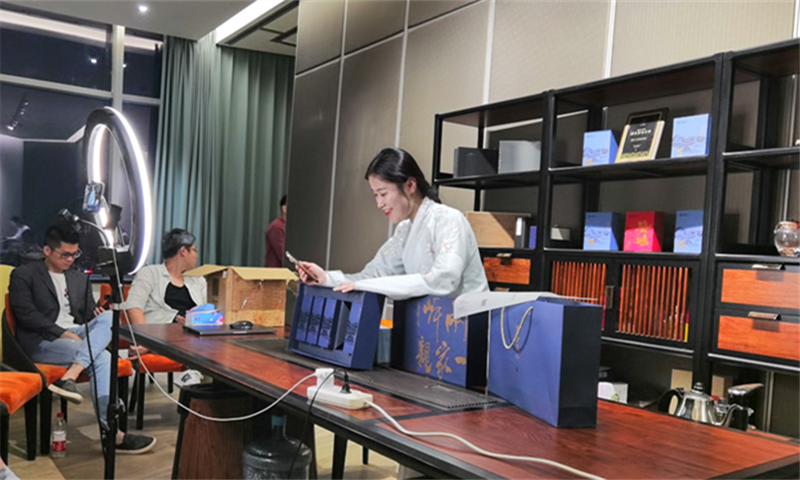
Taiwan residents learn llivestreaming skills in Hangzhou, East China's Zhejiang Province. (photo: courtesy of Shao Qing Technology)
As an increasing number of young people in Taiwan island have shown their enthusiasm to engage in the Chinese mainland's mushrooming e-commerce livestreaming industry, some mainland NGOs and companies are trying to offer them a helping hand. A nonprofit project in Hangzhou, East China's Zhejiang Province, where tech giants including Alibaba are located, has been launched to teach Taiwan youngster livestreaming promotion skills.The project aims to cultivate a total of 1,000 Taiwan livestreamers within three years, the Hangzhou Association of Taiwan Compatriots Investment Enterprises (HATCIE), the project's initiator, told the Global Times.
It rejects those with a "pro-independence" background, said some participants reached by the Global Times. The livestreamers are not supposed to make separatist remarks during the livestreaming, they said.
Participants said they are fine with the possible check on their political background by the project. "That's fair enough," a trainee named Yu Chih-pin told the Global Times. "It would offend the mainland audience if some of us suddenly shouted unfriendly slogans in the livestreaming."
Yu, a Taiwan entrepreneur who built a technology consulting company in Hangzhou, was one of the participants who enrolled in the courses at HATCIE's recommendation.
Though lacking livestreaming sales experience himself, Yu said he was very interested in the mainland's fast-growing industry, which can give his business more opportunities. "Also, the mainland has a good environment for cultivating talent in emerging industries," Yu added.
Today's Taiwan residents are attracted by the mainland's huge e-commerce market, and many of them would like to start a business or look for a job in this area, said HATCIE Deputy Director Tsung Chia-hung.
"Lots of young people from Taiwan in Hangzhou have told us that one of their ideal careers is to do livestreaming sales in the mainland, such as in Hangzhou," Tsung told the Global Times.
The project, organized by HATCIE and Hangzhou-based company Shao Qing Technology, started recruiting trainees on July 3. The first batch of 100 trainees were fully enrolled within 10 days, containing entrepreneurs, company staffers and university graduates from the island, said the company's CEO Shao Zhengjia.
During the five-month online training that will start on August 1, participants are going to learn detailed livestreaming skills for free, including how to select livestreaming equipment and how to interact with audiences, Shao told the Global Times.
Trainees will also learn the different usage of some terminology across the Straits, including when it comes to political aspects, Shao said.
"Taiwan livestreamers should pay attention to the way they refer to some politicians in the island," he said. "For example, if they had to mention Tsai Ing-wen in the livestreaming, we will suggest they call her 'Ms Tsai' instead of her other titles."
The project's participants agreed. "Just focus on the promotion," Yu said.
Compared with their tens of thousands of mainland peers, livestreamers from Taiwan have unique advantages in this highly competitive industry in the mainland, Shao said. "Taiwan regional accents sound warm and friendly to mainland audiences," he said.
Nonetheless, the mainland's major livestreaming platforms like Douyin and Kuaishou are not yet completely open to livestreamers from Taiwan, Tsung said. Only those with Chinese mainland ID cards can register as independent livestreamers on these platforms, he explained.
"Currently, Taiwan residents can do livestreaming promotions in the mainland under the name of a registered company," Tsung added.
Taking the situation into account, the project organizers said they are considering working with local human resource authorities and livestreaming platforms to issue a certification to qualified Taiwan livestreamers, which they hope may help this group better engage in this industry.
"We are looking forward to a more diverse and colorful e-commerce livestreaming market in the mainland with an increasing number of Taiwan livestreamers joining in," Shao said, adding that his company will hire some of the project's participants after the training with a yearly salary as high as 1 million yuan ($142,900).


